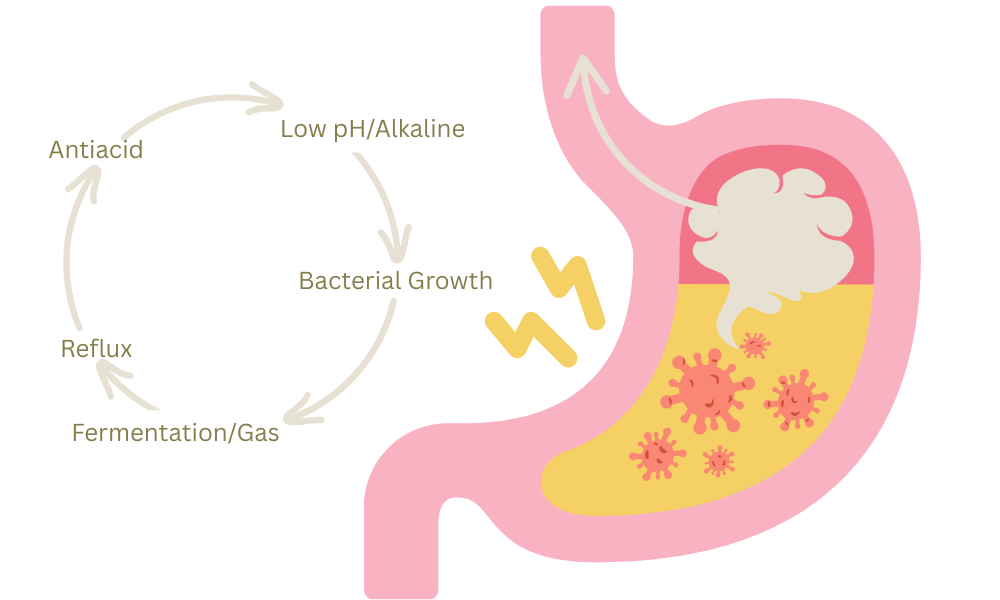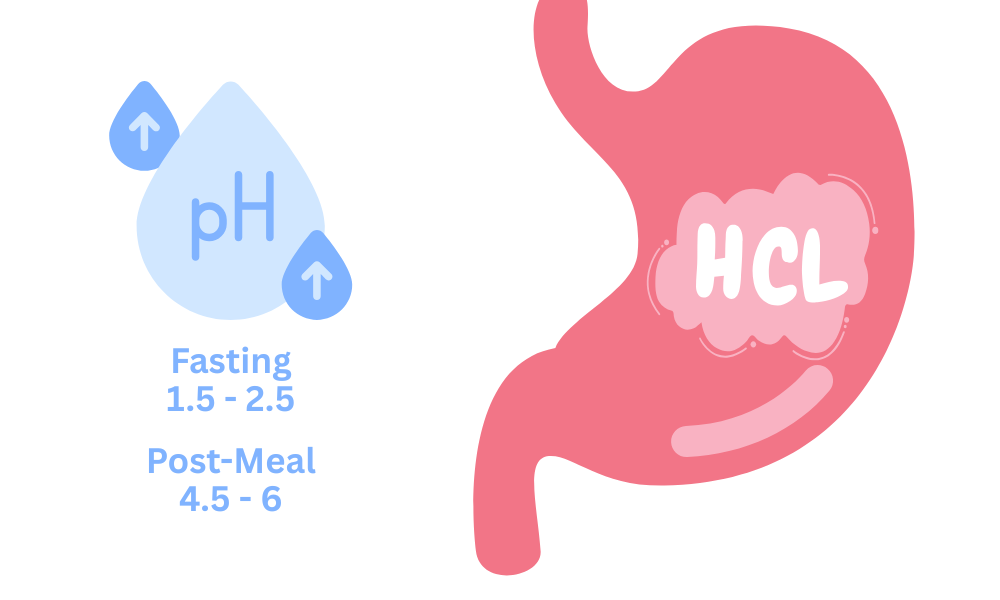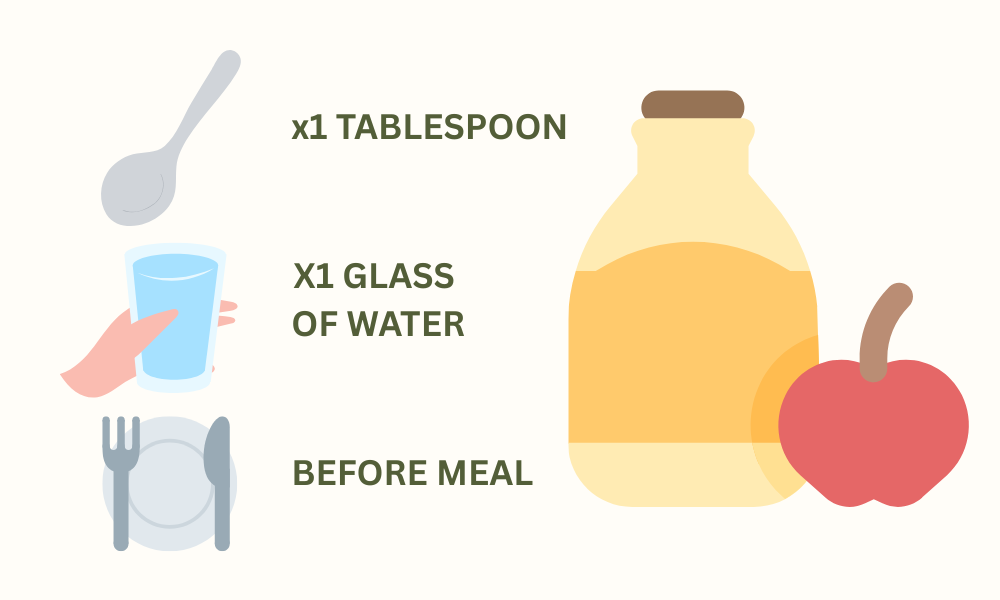We’ve all felt it; that burning sensation creeping up the chest, the sour taste in the back of your throat. HEARTBURN. It’s uncomfortable, persistent, and unfortunately common. So we reach for relief: an antacid, or maybe a doctor-prescribed acid-reducing pill. Problem solved… or is it?
Let’s take a closer look at what’s really happening inside your stomach and why long-term use of heartburn medication may be doing more harm than good.
What Really Causes Heartburn? It’s Not Always ‘Too Much Acid’
Contrary to popular belief, heartburn is often caused by too little stomach acid, not too much. Here’s how that works:
- When the stomach doesn’t produce enough acid, food isn’t properly broken down and digested.
- That food sits in the stomach longer, fermenting.
- Fermentation produces gas, which builds pressure and forces acid up into the oesophagus, causing that burning sensation we call reflux.
So, the issue isn’t excess acid, it’s acid in the wrong place due to poor digestion.

The Candida Connection: Low Acid, High Risk
Your stomach’s acidic is naturally so, and its environment also plays a critical defense role. It’s your first line of defense against invaders like Candida and other harmful bacteria. Candida is a type of yeast (a fungus) that naturally lives in small amounts in your body, especially in the gut. In small quantities they are harmless.
But when stomach acid is suppressed (via antacids or PPIs), things change:
- Candida and bad bacteria survive the stomach and settle in the gut.
- They thrive on refined sugars and starches (the same foods many of us eat daily).
- As they feast, they ferment the food, producing gas, bloating, and pressure, which again can lead to reflux and heartburn.
This internal fermentation is like a yeast factory in your gut, churning out bubbles that push stomach contents where they don’t belong.
Your Stomach: A Highly Regulated Acidic Machine
Your stomach isn’t just acidic by chance, it’s acidic by design. The stomach’s acid (mainly hydrochloric acid) has a very low pH, and that’s essential for:
- Breaking down food effectively
- Activating digestive enzymes (like pepsin for protein digestion)
- Absorbing key nutrients such as B12, magnesium, iron, and calcium
- Destroying harmful microbes before they reach your intestines
Your body uses pH sensors to constantly monitor stomach acidity. If things aren’t acidic enough, the sensors trigger acid production to correct the balance.

The Antacid Trap: Temporary Relief, Long-Term Consequences
When you take antacids or acid-suppressing medications, you’re telling your stomach:
“Stop making acid.”
But here’s the catch:
- The pH sensors detect the low acid and respond by trying to make more.
- Over time, this triggers an overproduction of acid to compensate, leading to even worse symptoms.
- The result? You become dependent on stronger medications to manage your discomfort.
This feedback loop can lead to chronic inflammation, ulcers, and other serious complications.
Long-Term Side Effects of Heartburn Medications
These pills may soothe symptoms short-term, but over time, they wreak havoc on your overall health.
1. Common Symptoms of Low Stomach Acid (Often Mistaken as “Too Much Acid”):
- Fatigue, brain fog, sluggishness
- Bloating, constipation, or diarrhea
- Muscle cramps or irritability
- Frequent illness or slow recovery
- Joint pain, arthritis, osteoporosis
- Poor sleep, restlessness
- Kidney pain or frequent urination
2. Poor Protein Digestion
The enzyme pepsin, which starts protein digestion, only activates in an acidic environment. Without enough acid:
- Protein is poorly digested
- Blood becomes thick and sluggish
- In live blood, we see sticky red blood cell chains, which a sign of digestive stagnation
3. Nutrient Deficiencies
Without acid, your body can’t break down nutrients into absorbable forms:
- Magnesium deficiency affects nerves, muscles, and kidneys
- Vitamin B12 deficiency leads to energy loss and neurological symptoms
- Iron deficiency results in pale, irregular red blood cells
4. Leaky Gut, Candida, and Gut Dysbiosis
Stomach acid normally kills Candida, bad bacteria, and parasites before they reach the intestines. With acid suppression, they survive and multiply.
They feed on sugars and starches, releasing toxins and gas, contributing to:
- Leaky gut syndrome
- Food intolerances
- Chronic inflammation
So What’s the Alternative?
You’re probably asking:
“If acid-blockers are risky long-term, how can I manage heartburn safely?”
While bicarbonate of soda (baking soda) is often used as a quick home remedy for heartburn, it’s important to understand that it works just like an antacid by neutralizing stomach acid. It acts similarly to the double edged sword antiacid.
The problem?
It may bring temporary relief BUT- like antiacids – it disrupts your stomach’s natural pH, which is supposed to stay highly acidic for proper digestion and defense against harmful microbes.
The Natural Reset: Apple Cider Vinegar (ACV)
It may sound strange, but acidic support, not suppression, is often the answer.
Organic Raw Apple Cider Vinegar (with the Mother) helps restore proper pH, supports digestion, and fools the body’s pH sensors into thinking acid levels are just right.
When you drink Raw Apple Cider Vinegar, the sensors say:
“Okay, acid levels are good. No need to overproduce.”
This calms the acid rebound cycle naturally.
How to Use It:
- Mix 15ml (1 tablespoon) of ACV in a glass of water
- Drink it before meals
- Do this once or twice a day
- Some mild discomfort is normal as your body rebalances

Lifestyle Tips for Naturally Supporting Healthy Stomach Acid
While supplements like Apple Cider Vinegar and herbal tinctures can work wonders, your daily habits also play a powerful role in how well your digestive system functions. Here are simple, natural lifestyle changes that support strong stomach acid production:
2. Chew Your Food Thoroughly
- Digestion starts in your mouth. The more you chew, the more you signal your stomach to prepare acid and enzymes.
- Aim for 20–30 chews per bite. This helps prevent bloating and encourages proper breakdown.
3. Eat in a Calm, Relaxed State
Your body needs to be in “rest and digest” (parasympathetic mode) to make stomach acid. Stress shuts this system down. Take a few deep breaths before eating. Avoid eating while standing, rushing, or distracted.
4. Reduce Refined Sugars and Processed Carbs
- Candida and other harmful bacteria thrive on sugar and ferment starches, creating gas and reflux.
- Stick to whole, unprocessed foods. Avoid sugary snacks, white bread, soda, and alcohol.
5. Eat Bitter Foods Before Meals
- Bitter flavors stimulate stomach acid and bile production, just like nature intended.
- Try a few bites of arugula, dandelion greens, rocket, or endive before meals. Lemon water or a splash of apple cider vinegar 15 mins before eating also helps.
Final Thoughts: Stop Fighting Your Stomach
Heartburn isn’t just a nuisance, it’s a message. Your body is telling you something’s out of balance. Instead of suppressing your stomach’s natural function, support it. Apple Cider Vinegar is a simple, powerful remedy that works with your body, not against it.
Need more support? Try our Gastric Relief tincture, a natural blend of digestive herbs designed to soothe and restore without side effects.
Your stomach isn’t broken — it’s just trying to protect you. Let’s work with it, not silence it. Relief is possible and it starts by respecting the acid.


Wow very insightful, I will definitely try the apple cider vinegar. As heartburn is part of my daily life.